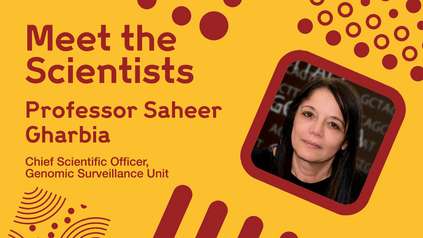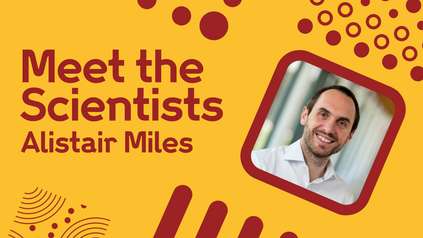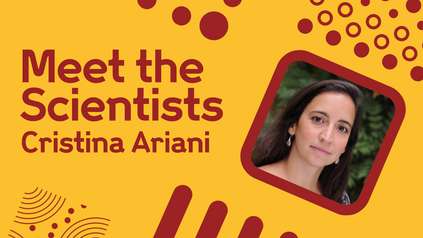Leading UK and South African genomics labs unite to take disease surveillance beyond COVID
Genomic surveillance laboratories in the UK and South Africa, renowned for their work identifying new variants during the COVID-19 pandemic, have joined forces to identify emerging threats from infectious diseases.
The Wellcome Sanger Institute’s Genomic Surveillance Unit (GSU) and Stellenbosch University’s Centre for Epidemic Response and Innovation (CERI) today (25 January) announce a new partnership to coordinate the genomic surveillance of infectious diseases globally.
This close relationship will allow teams in the UK and South Africa to share resources, coordinate strategies, and powerfully support partners in disease surveillance globally. Their ambitious international plans will allow scientists to monitor more pathogens in more places, including viruses carried by mosquitoes, water-borne diseases, respiratory viruses and other diseases with pandemic potential.1
Genomic surveillance continuously monitors the genetic changes and evolution of pathogens — viruses, bacteria, parasites — and their animal vectors, such as mosquitoes. This provides an early warning system for drug or vaccine resistance, indicates geographical spread, and alerts researchers and public health officials to the emergence of new diseases. The data are then used to inform public health responses at national and international levels.
While the technologies to track disease at a genomic level have been under development for decades, the power of genomic surveillance for public health decision-making was clearly recognised during the COVID-19 pandemic. Teams at the Sanger Institute and Stellenbosch University identified new variants of the SARS-CoV-2 virus and quickly fed information to partners in public health2, which led to near-real-time policy change. This new collaboration builds upon experience gained during the pandemic as well as decades-long legacies in the genomic surveillance of malaria, HIV, and other diseases.3
In light of the many factors driving up the threat from infectious diseases — climate change, habitat loss, urbanisation, globalisation — the development of genomic surveillance technology is more critical than ever.4
In order to strengthen the new partnership, Professor Tulio de Oliveira, who founded and leads CERI and was the team leader on the discovery of the Omicron variant, will also join the GSU in the role of Deputy Director.
These strong ties between teams in the UK and South Africa are part of the larger global effort to coordinate disease surveillance. Working with an international network of scientists, the GSU and CERI will deepen knowledge of how infectious diseases are evolving and spreading, and close the information gaps that threaten public health. In particular, these activities align well with the mission of the WHO’s new International Pathogen Surveillance Network (IPSN).
“We are really excited to launch this new partnership with the GSU. Between our two teams, we can share complementary facilities and work together on many diseases: from those carried by mosquitoes or floodwaters, to respiratory viruses with pandemic potential. We have amazing people and technology, we have shown strong results for multiple pathogens, and we have the attention of funders and governments. We are in a good position now to respond effectively to epidemics in our own regions, and support genomic surveillance across the world.”
Professor Tulio de Oliveira, Director of the Centre for Epidemic Response and Innovation (CERI) at Stellenbosch University, and Deputy Director of the Genomic Surveillance Unit (GSU) at the Wellcome Sanger Institute
“We have great hopes for this new partnership with CERI, and are incredibly proud to welcome Professor De Oliveira on-board. Our institutes may be thousands of miles apart, but our aims and thinking could not be closer. Genomic surveillance is critical to making informed decisions on public health. This new partnership will combine resources and expertise in both organisations to support the control of infectious diseases globally.”
John Sillitoe, Director of the Genomic Surveillance Unit (GSU) at the Wellcome Sanger Institute
More information
- The initial stages of this partnership will focus on pathogens including: insect-borne diseases such as malaria, dengue, zika, chikungunya and yellow fever; water-borne diseases such as cholera; and respiratory viruses such as influenza and coronaviruses, including any new ‘Disease X’ with pandemic potential. These are some of the highest-risk pathogens, the threats from which are likely to increase with climate change and other human factors.The control of infectious diseases is a global effort. As well as monitoring infectious diseases in their own countries, CERI and the GSU work with genomics partners worldwide. In Africa, strong partnerships exist with scientists in Ghana, Kenya, Malawi, Mali, Mozambique, Senegal, Tanzania and The Gambia. Further work is ongoing with partners in the Americas, in particular Brazil, as well as South and Southeast Asia, and with the WHO at the international level.
- Professor Tulio de Oliveira led the team that confirmed the discovery of the COVID-19 Beta variant in late 2020 and then the Omicron variant in 2021. This team formed the foundation of CERI. Meanwhile, at peak capacity in 2021, the Wellcome Sanger Institute was sequencing up to 64,000 COVID-19 samples per week – more than any other laboratory in the world. This team has since formed a core part of the GSU.
- The Wellcome Sanger Institute has played a central role in the Malaria Genomic Epidemiology Network (MalariaGEN) since 2005, using genetics to study changes in the malaria parasite and its mosquito vectors. MalariaGEN partners built the world’s largest public malaria genomic data resources. For over 20 years, Professor Oliveira has worked on virus outbreaks including HIV, Hepatitis B and C, and several insect-borne diseases. Since the pandemic, CERI has turned its attention to mosquito-borne diseases, with success tracking outbreaks of dengue and chikungunya viruses in Senegal and Kenya.
- In 2022, CERI launched the Climate Amplified Diseases and Epidemics (CLIMADE) consortium, of which the GSU is also a member. Professor De Oliveira presented CLIMADE’s research at the UN’s COP28 Health Day, the first such event at a COP meeting to foreground the link between climate change and public health.
Funding:
The Genomic Surveillance Unit receives funding from the UK Health Security Agency (UKHSA), Bill & Melinda Gates Foundation (BMGF), and the National Institute for Health and Care Research (NIHR).
The Centre for Epidemic Response and Innovation receives funding from Africa Centres for Disease Control and Prevention (Africa CDC), Chan Soon-Shiong Family Foundation (CSSFF), the Department of Science and Innovation (DSI) in South Africa, European Commission (EC), Illumina, National Institute of Health (NIH), Oxford Nanopore Technologies, The Rockefeller Foundation, South African Medical Research Council (SAMRC), Stellenbosch University, Wellcome, World Bank, World Health Organisation (WHO).





